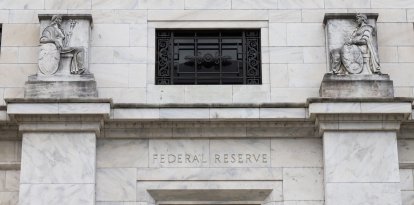Stock panic over Trump's tariffs plummets Asian bourses
Tokyo's Nikkei 225 index was losing 7.35% in morning trade Monday, following a 2.75% drop on Friday, while Seoul's Kospi index lost 4.8%.

Taiwanese stocks plunged 9.8% on April 7
Asian stock markets plunged at the open Monday, after U.S. futures contracts anticipated steep losses on Wall Street ahead of the panic unleashed by President Donald Trump's tariffs around the world.
A universal import tax of 10% went into effect in the U.S. on Saturday. On Wednesday, levies will increase on imports from some countries, such as members of the European Union (20%) and China (34%), Trump announced on April 2.
The announcement triggered a plunge in markets around the world, which extended into Monday's Asian open.
Tokyo's Nikkei 225 index lost 7.35% in morning trade Monday, following a 2.75% drop on Friday, while Seoul's Kospi index lost 4.8%.
Similarly, the benchmark S&P/ASX 200 index of Australia's largest 200 companies lost 6.09% minutes after the Sydney stock exchange opened.
Taiwan's Taiex index collapsed 9.8% while Singapore's Straits Times lost 7.37%, and Hong Kong's Hang Seng fell 9.28%.
The Shanghai stock exchange also lost 4.21%.

Economy
JPMorgan es el primer gran banco de Wall Street en pronosticar una recesión en EEUU para este 2025
Emmanuel Alejandro Rondón

Economy
iPhone, coffee, cars, clothes and much more: These are some of the products whose price could rise due to tariffs
Emmanuel Alejandro Rondón
Trump denied Sunday that he planned an intentional selloff in stocks and insisted he could not foresee market reactions.
He warned that he would not strike a deal with other countries unless trade deficits were resolved.
U.S. companies have lost value to the tune of trillions of dollars since the start of its tariff offensive.
Futures contracts on major New York Stock Exchange indexes were down sharply on Sunday, pointing to a further drop on Wall Street on Monday, still reeling from the wave of tariffs.
And U.S. crude oil fell below $60 a barrel for the first time since April 2021.
"You can't start from scratch"
The Trump administration, through Treasury Secretary Scott Bessent, said Sunday that more than 50 countries have asked to negotiate to eliminate or reduce tariffs imposed by Washington, talks that, he added, could take months to bear fruit.
China immediately responded to the taxes on its products with similar measures against the United States.
Instead, European leaders stepped up their contacts over the weekend ahead of a meeting of European Union (EU) trade ministers on Monday to agree on the bloc's response.
"The world as we knew it is gone," predicted British Prime Minister Keir Starmer in the face of this change in international trade.
Little openness
U.S. Commerce Secretary Howard Lutnick warned on CBS Sunday that the new tariffs that take effect April 9 will not be subject to possible negotiations.
Countries seeking a negotiated way out of Trump's trade war are doing so because they believe their economies "are going to suffer a large part" of the consequences of the tariffs, top White House economic adviser Kevin Hassett said Sunday on ABC.
The head of the National Economic Council predicted that there will not be "a major effect on consumers in the United States."
Most economists instead foresee an increase in inflation and a slowdown in the U.S. economy as a result of the tariffs.
While Hassett acknowledged that there may be a rise in prices, he saw Trump's protectionist measures as a way to defend U.S. workers from unfair competition.
Asked why Russia was not on the list of countries affected by the tariffs, the advisor said that Trump wanted to avoid including it because of the dealings for a possible end to the conflict in Ukraine.

























